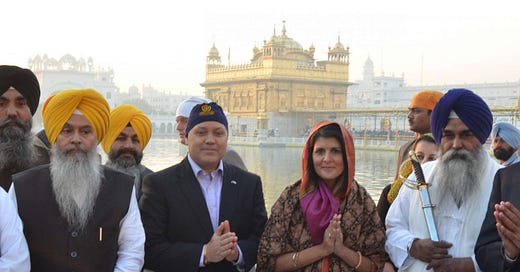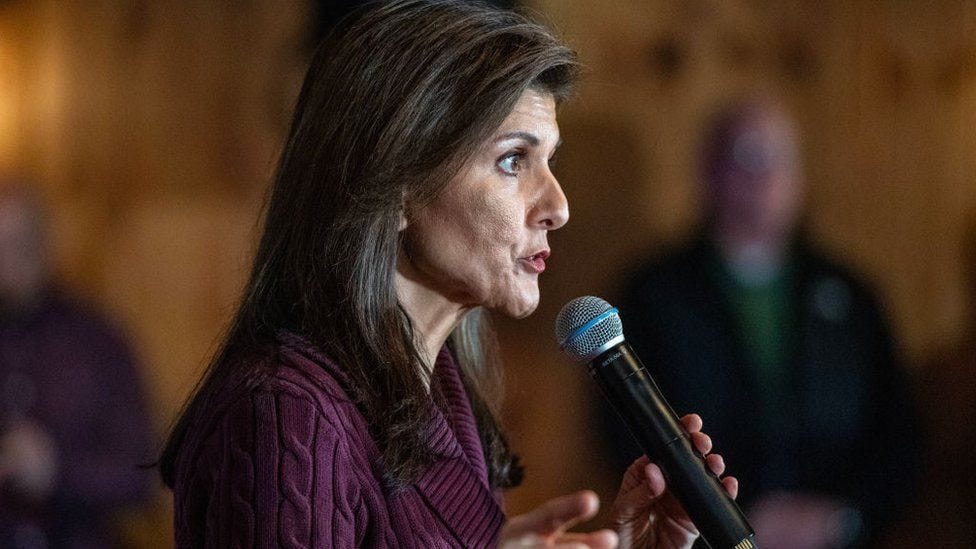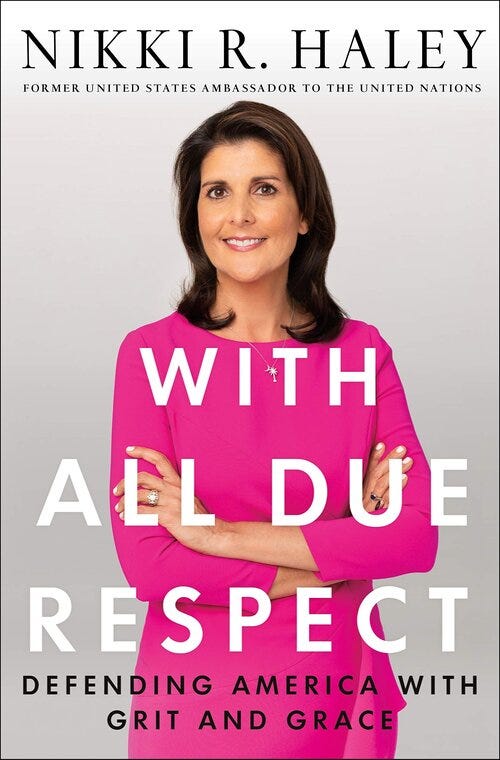Nimarata Randhawa to Nikki Haley: Roots to Fruit
Birthday Reflections: Nikki Haley's Leadership Trajectory.
Thumbnail Sketch
Nikki Haley, who turns 52 today, stands as a prominent figure in American politics, her career weaving together the threads of her cultural heritage, personal convictions, and a nuanced political trajectory. Born Nimarata Nikki Randhawa to Indian immigrant parents in South Carolina, Haley's rise in the political sphere has been both groundbreaking and, at times, contentious. As South Carolina's first female governor and the first Sikh-American to hold such a high office in the U.S., she represents both progress and the challenges of navigating diverse identities in American public life.
Haley's journey from her upbringing in the Sikh faith to her conversion to Christianity at 24, alongside her marriage to Michael Haley and their life with their two children, Rena and Nalin, reflect the personal dimensions of her public persona. Regularly attending the United Methodist Church while also maintaining ties with her Sikh heritage, she embodies the complex interplay of faith and cultural identity in America.
Her role as the U.S. Ambassador to the United Nations under President Donald Trump further defined her as a resolute advocate for U.S. interests and democratic values. It also brought to the fore her ability to adapt and evolve in her policy positions, navigating the delicate balance between her cultural identity and her political ambitions. This journey, marked by significant achievements and robust discussions, provides a rich narrative for exploring the intricate connections between personal ambition, cultural roots, and the dynamic nature of political discourse in contemporary America.

Her Memoirs
"With All Due Respect: Defending America with Grit and Grace" is Nikki Haley's memoir, published in 2019. In this book, Haley recounts her journey from being the daughter of Indian immigrants to becoming a prominent figure in American politics.
Key aspects of the memoir include:
Personal and Political Journey: Haley discusses her upbringing in Bamberg, South Carolina, where she faced challenges as part of one of the few Indian-American families in the area. She delves into her entry into politics, her tenure as the Governor of South Carolina, and her role as the U.S. Ambassador to the United Nations.
Governorship of South Carolina: Haley reflects on her time as Governor, including her response to the Charleston church shooting in 2015. This event marked a significant moment in her governorship, particularly her decision to remove the Confederate flag from the state capitol grounds, a move that garnered national attention and mixed reactions.
Tenure at the United Nations: As the U.S. Ambassador, Haley was known for her assertive approach in representing American interests. The memoir gives an insider's view of her interactions with international leaders and her perspective on key global issues.
Insights into the Trump Administration: Serving under President Donald Trump, Haley offers a glimpse into the workings of his administration. She discusses her agreements and disagreements with Trump and other senior officials, providing a candid view of the internal dynamics of the government during her tenure.
Perspectives on U.S. Foreign Policy: Haley discusses her views on various international matters, including relations with countries like North Korea, Russia, and Iran, and her stance on Israel.
Personal Beliefs and Future Aspirations: Throughout the book, she articulates her political beliefs, including her advocacy for human rights and democratic principles. Haley also touches upon her future aspirations, which has led to speculation about her potential candidacy for higher political office.
Overall, "With All Due Respect" is not just a political memoir but also a narrative that intertwines Haley's personal experiences with her public life, offering insights into her character, leadership style, and views on significant national and international issues.
Diplomatic Dynamics and Tensions in Haley's UN Role
Understanding that many of our readers, intrigued by Nikki Haley's diverse experiences at the United Nations, may not have the leisure to delve into her extensive biography, we offer a succinct overview of the 12 most pivotal issues from her UN tenure. This summary aims to provide clear, concise perspectives on key aspects of her ambassadorship. For those interested in a more in-depth exploration, we recommend reading her memoirs for a comprehensive understanding of her diplomatic journey.
Early Diplomatic Success and Frictions with Trump: Nikki Haley's initial period as the U.S. Ambassador to the United Nations was marked by notable diplomatic successes. However, her approach sometimes diverged from President Donald Trump's, particularly on global issues. Despite leaning towards Trump's policies on certain matters, she faced criticism from him and others in his circle for being perceived as a 'globalist', illustrating the complex nature of her role and the ideological differences within the administration.
Middle East Policy Proposal and Inner Conflicts: Haley's tenure featured a bold proposal to cut U.S. funding for a U.N. program aiding Palestinian refugees, aiming to jump-start Middle East peace talks. This idea, coming from the ambassador herself, was especially striking given her previous visit to a West Bank refugee camp. The proposal led to significant internal debate within the Trump administration and highlighted the tension between Haley's diplomatic objectives and the broader goals of the Trump presidency.
Balancing Act as UN Ambassador: Navigating her role as the U.N. Ambassador under Trump's presidency, Haley performed a delicate balancing act. She strategically avoided public criticism of Trump, focusing instead on gaining direct access to him for discussions and decision-making. This approach, while helping her maintain influence, caused friction with other White House officials and underscored the political tightrope she walked.
Shift in Public Stance and Growing Rifts: Over time, Haley's public stance towards President Trump evolved. Initially, she downplayed their disagreements in her memoir, but later her tone shifted, increasingly critiquing Trump's policies and leadership. This change coincided with a cooling of Trump's support for her, as he began to mock her as a "globalist," signifying a growing rift in their relationship.
Navigating Foreign Policy and Administration Politics: Haley's role as the U.N. Ambassador, her first significant foray into foreign affairs, presented numerous challenges. She often found herself at odds with other members of Trump's Cabinet, particularly over her political ambitions and her direct line to the President. These internal conflicts, compounded by her limited experience in foreign policy, created a complex dynamic within the administration.
Crucial Decisions and Strategic Alliances: One of Haley's pivotal decisions was to align with Trump’s son-in-law and senior adviser, Jared Kushner, in cutting U.S. funding to Palestinian aid. This move, which indicated a significant shift in her diplomatic approach, was seen as aligning with a harder line that pleased the President. It showcased her political acumen and adaptability, but also brought criticism for what some saw as a departure from her previously stated positions.
Complex Relationship with Trump and Administration: Haley's relationship with President Trump and other cabinet members was intricate and sometimes contentious. Disagreements over key policy decisions and her approach to handling these differences were emblematic of the challenges she faced in navigating the political landscape of the Trump administration.
Policy Divergences and Haley’s Direct Approach: Throughout her tenure, Haley often took a direct approach in dealing with Trump, bypassing standard diplomatic and administrative protocols. This method led to significant internal conflicts, particularly with figures like John Bolton and Mike Pompeo, and highlighted her independent stance and willingness to engage directly on foreign policy issues.
Contrasting Views on Russia: A major point of contention between Haley and Trump was their differing views on Russia. Haley's more critical stance on Russian policies and actions, particularly regarding Syria and election interference, contrasted sharply with Trump's more accommodating view of Russian President Vladimir Putin. This difference was a recurring source of tension and disagreement.
Cabinet Dynamics and Haley’s Influence: The dynamics within Trump's Cabinet significantly influenced Haley's role and her ability to effect change. Her direct access to Trump and her independent decision-making often put her at odds with other key figures in the administration, affecting her influence and the perception of her within the White House.
Strategic Decisions and Political Implications: Haley's strategic decisions, particularly regarding Palestinian aid and her broader foreign policy stance, had far-reaching political implications. These decisions were reflective of her evolving political views and strategy, aligning her with certain factions within the Republican Party and shaping her public and political persona.
Presidential Aspirations and UN Disillusionment: As Haley considers a presidential run, her experiences at the UN and in the Trump administration form a crucial part of her political narrative. Her campaign emphasizes her Cabinet experience while also expressing disillusionment with the UN's effectiveness. These experiences have shaped her views on foreign policy and her approach to U.S. involvement in international affairs.
Balancing Heritage and National Interest: Nikki Haley's Diplomatic Stance
Due to her Indian, Punjabi Sikh roots, there are expectations from some quarters that Nikki Haley's decisions and policies might lean in favor of India. However, it is crucial to remember that she is a US-born citizen, and her allegiance is primarily to the United States, irrespective of her heritage and family background. While her Indian connection undoubtedly gives her a unique perspective, especially in understanding the complexities of the Indian stance, particularly in relation to Pakistan and the historical context of Punjab's partition in 1947, her overarching decisions are expected to be guided by the sovereign interests of the USA. Haley's role, therefore, is a delicate balance between appreciating her roots and fulfilling her responsibilities toward American national interests.
Birthday Reflections: Nikki Haley's Leadership Trajectory
As we extend our warmest greetings to Nikki Haley on her birthday today, January 20th, we also acknowledge her significant standing in the current race for the Republican presidential nomination. Although she trails behind Donald Trump, her position is a clear indicator of her resilience, grace, and an ascending popularity within the party. Despite being in a distant second place, her capability to surpass other GOP contenders highlights her astute political skills and the compelling nature of her leadership.
Importantly, Haley has upheld a level of dignity in her approach, steering clear of the incendiary rhetoric often used by Trump, known for his unabashed style. In debates and public appearances, she has consistently demonstrated not only a strong command of facts and figures but also the skill to articulate witty and incisive retorts when needed. This blend of accuracy, precision and sharp repartee signals her strength as a potential candidate. While the road to the 2024 presidential race presents challenges, Haley's path suggests a bright future, potentially positioning her as a viable candidate for the presidency in 2028. Her journey, characterized by steadfast determination and strategic savvy, has resonated with many who view her as a dynamic and capable presence in American politics, making her a deserving candidate for the United States's highest office.







